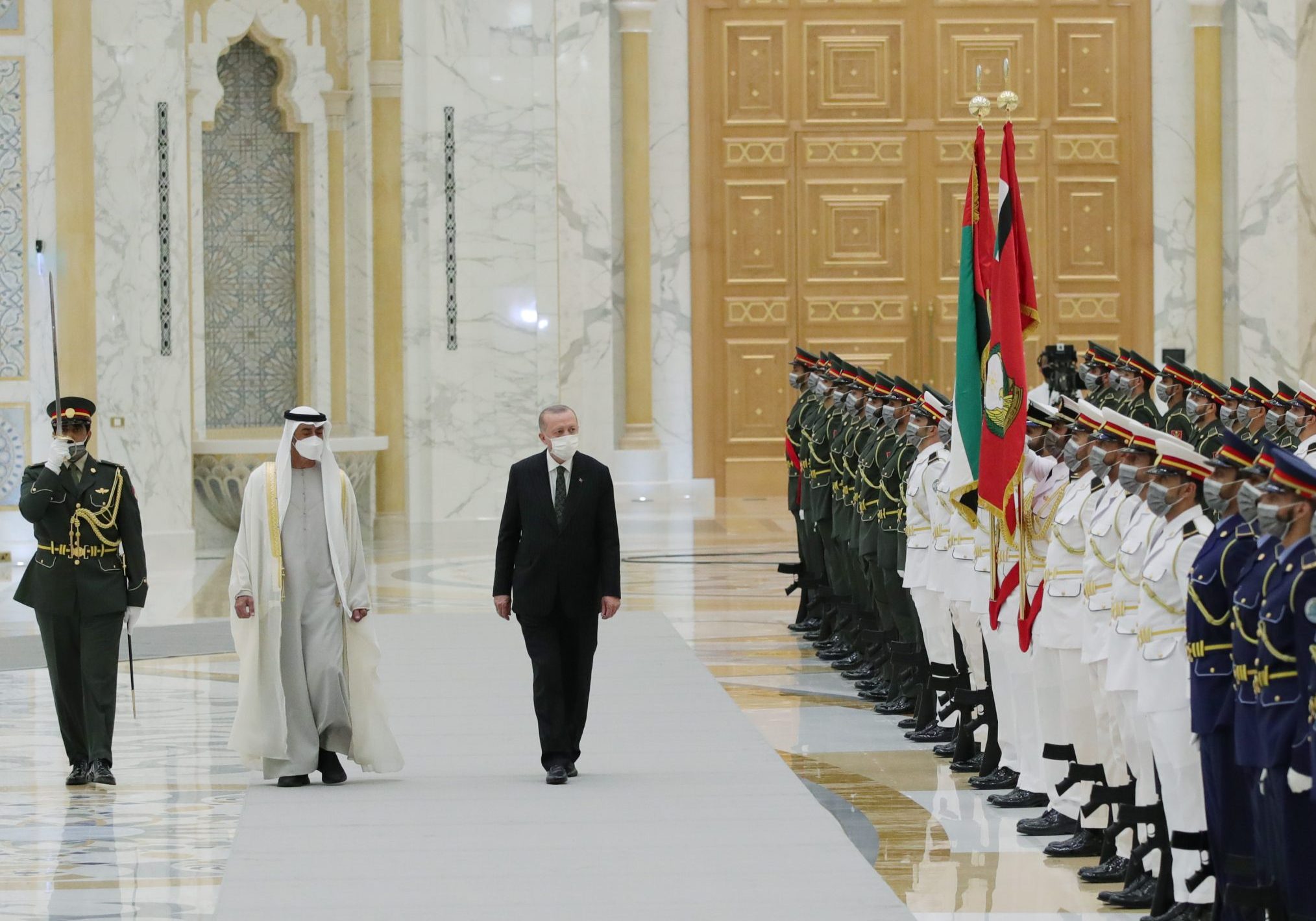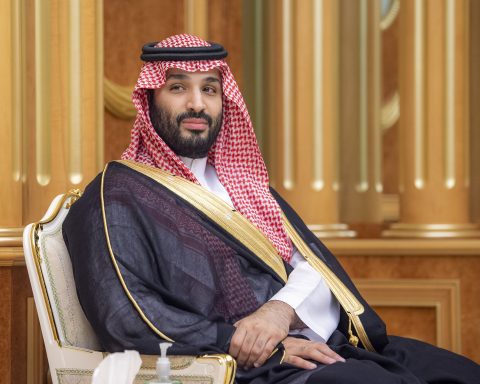After nearly a decade, Turkish President Recep Tayyip Erdogan paid an official visit to the United Arab Emirates (UAE), attracting regional and international attention. Erdogan met with high-ranked Emirati officials, including the Crown Prince of Abu Dhabi, Mohammed bin Zayed al-Nahyan. Many Emirati media outlets praised the visit by interpreting that Turkish-Emirati relations are on the verge of a giant leap forward. Therefore, Erdogan’s return visit is a concrete sign proving that bilateral relations have entered a new phase.
On the first page of the National, a newspaper based in the UAE, the visit highly praised and titled “The UAE and Turkey hail new era of ‘prosperous’ ties,” Anwar Gargash, a top advisor of the President of the UAE, emphasized that the talks with Turkish President Recep Tayyip Erdogan included Abu Dhabi’s efforts to ensure stability and prosperity in the region. Gargash stated that this visit is also in line with the UAE’s tendencies to strengthen cooperation bridges aimed at the peace and prosperity of the area and noted that the visit would open a new positive page. President Erdogan penned an op-ed for Khaleej Times, stating that the visit proves time for regional peace and cooperation initiatives. In addition to that, the President of the Turkish Directorate of Communications, Fahrettin Altun, wrote an Arabic op-ed to Al-Ittihad. In his piece, Altun pointed out that international and regional cooperation is not a choice but an obligation. Therefore, from a Turkish perspective, reclaiming cooperation is more rational than fueling competition. The same goes for the UAE.
Diplomacy plays
The UAE warmly welcomes Erdogan by preparing an impressive welcoming ceremony. In tradition, warplanes cannon salutes are shown. Even the glorious reception of the Turkish delegation led by President Erdogan suggests that the advancement of the political will between the two towards the maintenance of the high-level relations has been a key to further talks, said Gokhan Ereli, the Gulf Studies Coordinator at the Center for Middle Eastern Studies in Ankara.
One of the most famous Arab singers, Hussain al-Jassmi, sang Erdogan’s favorite song, which he frequently used in his election campaign. That shows the UAE has been strictly following Turkish politics. The song is the most-loved song by Erdogan. Therefore, according to Marc Owen Jones, an expert on the Middle East, the UAE launched musical diplomacy. Moreover, by showing the Turkish flag on the world’s tallest skyscraper, the UAE benefits from the Burj Khalifa by instrumentalizing it as a tool for diplomacy, according to Rumeysa Ayverdi, a researcher at Sakarya University’s Middle East Institute.
On the other hand, the official Emirates News Agency (WAM) shared a video clip in which the Emirates welcomed Turkey by saying it in Turkish. Moreover, many social media users in the UAE have glorified the visit. For example, popular Emirati social media user Hassan Sajwani emblazoned this Twitter account to share Turkey.
Catalyst dynamics
At least two dynamics catalyzed the normalization or accelerated the process. The first one is security-related issues, and the second one is the economic concerns of both sides.
President Erdogan said that Turkey does not differentiate between Gulf security and its national security. There are at least two common concerns that both countries suffer from. The first one is about the US. Since the Obama administration, Washington formulated a reluctant Middle East policy that disengaged the US from intervening in the region. This political choice altered its allies’ security alignment. Because the absence of a great power in the Middle East offered opportunities to armed non-state actors such as the Houthis in posing threats to the Gulf, recently, the UAE suffered from Houthis’ attack, which Turkey harshly criticized. Proving its military power and victory in many cases such as Syria, Libya, and Azerbaijan, Turkey can help the UAE eliminate the Houthis. The second security issue that both countries can work on is the F-35. The US did not sell the F-35 to Turkey. The same scenario happened to the UAE. The UAE was promised F-16s in exchange for its normalization with Israel. However, there are rumors about the F16 deal as well, said Hamdullah Baycar, a Ph.D. candidate at Exeter University. Therefore, there is a structural security problem related to the US. The US is reluctant to give security commitments to the Gulf, where Turkey deployed its troops. Therefore, Turkey can provide security guarantees to the UAE. In this regard, Abu Dhabi can purchase drones produced by Turkey to eliminate Houthis’.
Economic priority
The second dynamic is about the economy. Both sides are eager to raise their trade volume. Erdogan said that they want to double the trade volume. Yusuf Bahadir Keskin, a researcher on Gulf affairs, thinks that the first area in which positive results will be reflected will be in the economy. Prioritizing the economy has at least three primary dimensions.
The first one is about post-COVID-19 preparedness. The UAE tries to prepare itself for the post-COVID-19 economy. To cover the damage of COVID-19, Abu Dhabi prioritizes economic gains rather than pursuing political ambitions. In this sense, many countries, including Turkey, were offered free trade deals. In Erdogan’s visit, free trade talks have started between two countries, which is the most crucial dimension. The free trade talks allow businesspeople to engage more with each other. Moreover, if the negotiations are successful, the butterfly effect can be seen. In this sense, an economy-centered normalization can be applied to Turkish-Saudi relations.
The second one is about Turkey’s new economic model. Erdogan has been against a high-interest rate model in the economy. His financial plans are based on investment, production, employment, and export. Therefore, for Turkey, the UAE represents a significant trade partner. Even during times of political tension and rivalry, trade between the two countries worked adequately. For example, in 2020, bilateral trade volume was about $7.3 billion, which later increased up to $8.9 billion in 2021. To increase the trade volume, institutional cooperation is needed. This target complies with the UAE’s plan to increase non-oil trade volume to transform its oil-based economic model that triggers intra-Gulf rivalry.
The third dynamic is about intra-Gulf competition. The poles in the Gulf have witnessed convergences and differences even between the UAE-Saudi Arabia alignment that has been seen as the strongest one. The UAE wants to be a regional trade hub, which is a goal also desired by Saudi Arabia. Turkey presents excellent opportunities for achieving this target. The UAE does not want to lose Turkey to Qatar, which hosts Turkish troops in the latter. Therefore, an intra-Gulf competition pushed the UAE to mend its ties with Turkey.
To sum up, Erdogan’s visit to the UAE opened a new page due to the positive political atmosphere covered in the region. It can be stated that the period of tension seems to be over. Therefore, the visit is the recent demonstration of the consolidation of communal politics that will be brewed between Turkey and the UAE to strengthen economic, political, and every other policy area. More detailed and tangible progress will probably be reached in the following months, especially in political and military-related areas such as the advancement of talks regarding the defense industry, said Gokhan Ereli.
The visit is critical in putting Turkey-UAE relations on the right track. Judging by the superb reception prepared for President Erdogan in the UAE, Abu Dhabi signals its seriousness to advance these relations to unprecedented levels that might surpass the economic dimension and into other areas in the future, said Ali Bakeer, an Assistant Professor at Qatar University. The 13 agreements signed between the two countries prove that the normalization process is now standardized and embraced on both sides. In other words, Erdogan’s return visit can be read as a sign that the seeds of this new pragmatist approach are planted. Turkish-Emirati normalization refers to the process yielding the fastest results in the normalization dialogues in the foreign policy of both countries. Turkey and the UAE acted pragmatically and reached a new approach to alter these dimensions.













